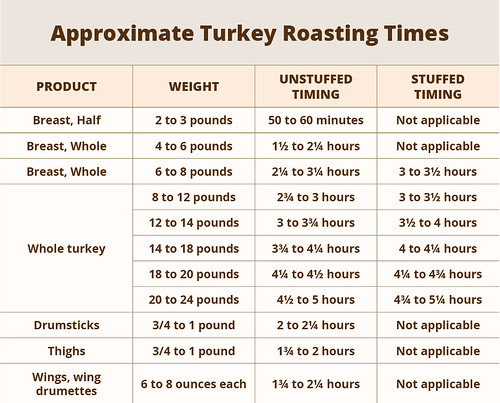Feb 21, 2017

As with many things in life, when cooking a turkey you can do it the easy way, or you can do it the hard way.
Traditional Roasting (Easy)
The easy way? Pop that turkey into a roasting pan, set the oven to 325˚F, and check back in a couple hours. When your food thermometer registers 165˚F in the innermost part of the thigh, the innermost part of the wing and the thickest part of the breast, the turkey is ready. Let it stand for 15-20 minutes so the juices can settle, then it’s ready to carve.
Traditional Stuffed Roasting (Easy)
This method it still easy, but requires a little more work. Shortly before you plan to put the turkey in the oven, prepare your stuffing, and stuff the turkey. When your food thermometer registers 165˚F in the innermost part of the thigh, the innermost part of the wing, the thickest part of the breast and the center of the stuffing, the turkey is ready. Remove the stuffing immediately and cover. Let the turkey stand for 15-20 minutes so the juices can settle, then it’s ready to carve.
Oven Bag Roasting (Easy)
If you want to cook your turkey the easy way, but a little faster, use an oven bag. The oven bag will save cooking and cleanup time. Follow the cooking directions on the box; add 30 minutes to the recommended cooking time if you choose to stuff your turkey. Your turkey is safe to eat when the thermometer registers 165˚F in the innermost part of the thigh, the innermost part of the wing, the thickest part of the breast and the center of the stuffing.
Grilling or Smoking (Moderate)
Cooking the turkey outside leaves more room for other dishes in the oven and also results in a delicious turkey. Grilling is cooking food over direct heat on a rack set over charcoal, wood or special rocks heated by a gas flame. Allow 15 to 18 minutes per pound when cooking a turkey on the grill. When the weather is cold it could take longer. Smoking is cooking food indirectly and slowly over a drip pan in a covered grill or smoker. Cooking time depends on many factors: the type of meat, its size and shape, the distance of food from the heat, the temperature of the coals and the weather. It can take anywhere from 4 to 8 hours to smoke a turkey.
Turkeys that are grilled or smoked should not be stuffed. Smoked or grilled, your turkey is safe to eat when the thermometer registers 165˚F in the innermost part of the thigh, the innermost part of the wing and the thickest part of the breast. For more information on grilling, see: Barbecue and Food Safety ![]() . For information on smoking, see: Smoking Meat and Poultry
. For information on smoking, see: Smoking Meat and Poultry ![]() .
.
Spatchcocking (Advanced)
"Spatchcocking" is a fancy term for cooking a whole turkey or chicken by removing the backbone and splaying the bird out flat. Among the benefits of spatchcocking are a quicker cooking time, easier carving and a moister turkey. The turkey also takes up less room in the oven since it is flat.
To spatchcock your turkey, use sturdy kitchen shears to cut along the both sides of the turkey's backbone and remove it. Flip the bird over and flatten it by breaking the breast bone. Brush your turkey with olive oil, salt and pepper (if desired). Roast at 450˚F for approximately 70 minutes for a 12 pound turkey. Your turkey is safe to eat when the thermometer registers 165˚F in the innermost part of the thigh, the innermost part of the wing and the thickest part of the breast.
Fried Turkey (Advanced)
Although a whole turkey can cook in less than an hour using this method, there are safety concerns when working with such a large amount of hot oil. A whole turkey can be successfully cooked by the deep fat frying method, provided the turkey is not stuffed and has been completely thawed. The turkey should be 12 pounds or less in size. For more information about deep fat frying a turkey, please see: Deep Fat Frying and Food Safety ![]() .
.
After Cooking
When dinner is over, carve the rest of the turkey from the bone and refrigerate it immediately. For safety, make sure the turkey is refrigerated within 2 hours of coming out of the oven. To make using those leftovers easy, divide the turkey up into meal-sized portions. Use leftovers within 4 days or freeze them. If there is gravy left over, you can freeze that too. Although this future dinner will be safe indefinitely, it will taste best if you eat it within 4 months.
If you have questions about roasting your turkey, call the USDA Meat and Poultry Hotline at 1-888-MPHotline (1-888-674-6854), or chat live with a food safety specialist at AskKaren.gov ![]() , available from 10:00 a.m. to 4:00 p.m. ET, Monday through Friday, in English or Spanish.
, available from 10:00 a.m. to 4:00 p.m. ET, Monday through Friday, in English or Spanish.
